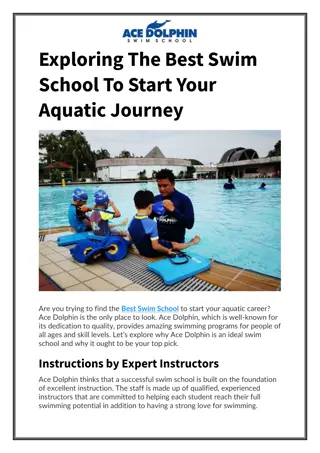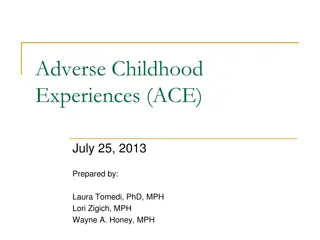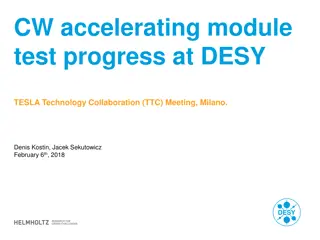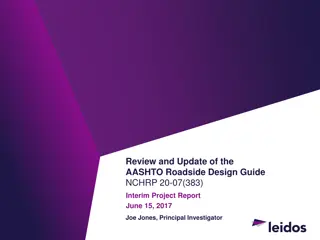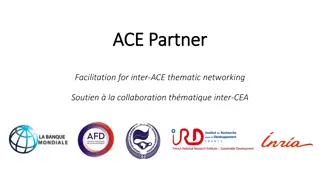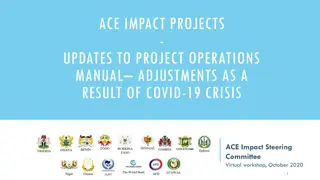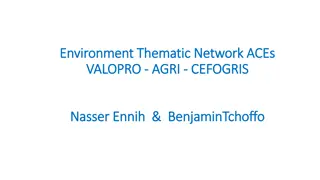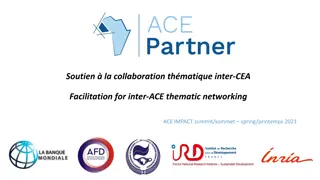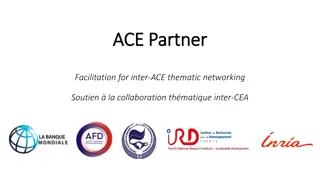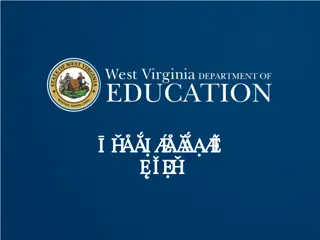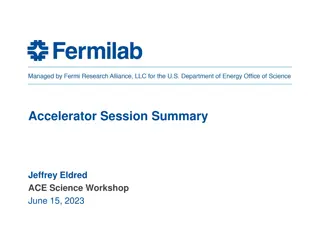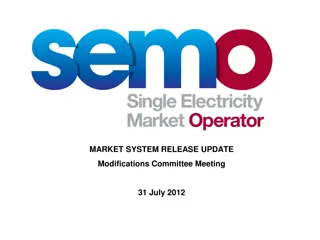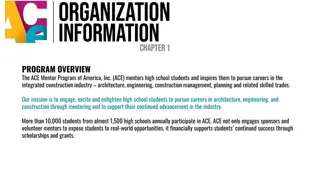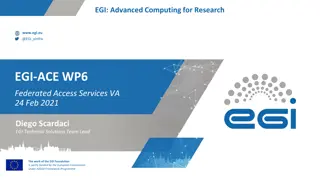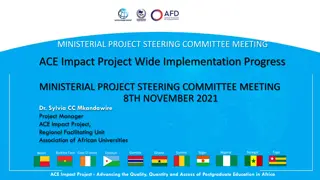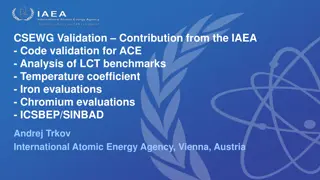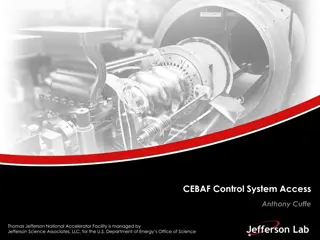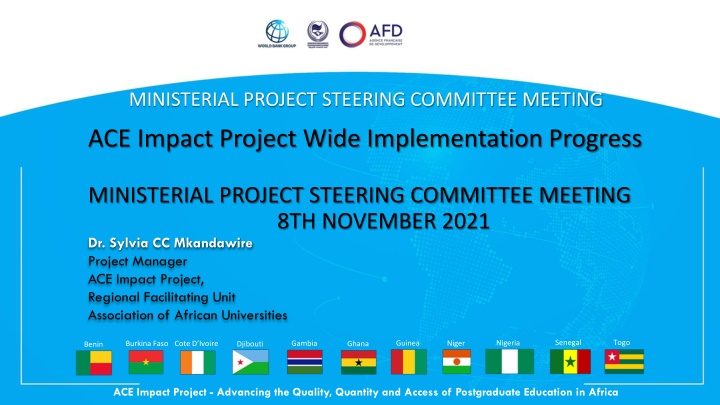
ACE Impact Project Progress Update
The Ministerial Project Steering Committee meeting on 8th November 2021 discussed the wide implementation progress of the ACE Impact Project. The project, led by Dr. Sylvia C.C. Mkandawire, aims to advance postgraduate education in Africa through various initiatives across multiple countries. Key areas of focus include capacity building, partnerships, and networking initiatives to enhance the quality, quantity, and access of education in Africa.
Download Presentation

Please find below an Image/Link to download the presentation.
The content on the website is provided AS IS for your information and personal use only. It may not be sold, licensed, or shared on other websites without obtaining consent from the author. If you encounter any issues during the download, it is possible that the publisher has removed the file from their server.
You are allowed to download the files provided on this website for personal or commercial use, subject to the condition that they are used lawfully. All files are the property of their respective owners.
The content on the website is provided AS IS for your information and personal use only. It may not be sold, licensed, or shared on other websites without obtaining consent from the author.
E N D
Presentation Transcript
MINISTERIAL PROJECT STEERING COMMITTEE MEETING ACE Impact Project Wide Implementation Progress MINISTERIAL PROJECT STEERING COMMITTEE MEETING 8TH NOVEMBER 2021 Dr. Sylvia CC Mkandawire Project Manager ACE Impact Project, Regional Facilitating Unit Association of African Universities Senegal Togo Nigeria Guinea Gambia Niger Burkina Faso Cote D Ivoire Ghana Djibouti Benin ACE Impact Project - Advancing the Quality, Quantity and Access of Postgraduate Education in Africa
Summary Progress Key Observations Status Update on RSIF Component National Project Facilitation Regional Project Facilitation Implementation Support to the Centres Networking Initiatives Capacity Building Webinars Partnerships Presentation Outline
ACE Impact: Building Capacity Across Africas Priority Sectors ACE Impact: Building Capacity Across Africa s Priority Sectors 53 Centers (43 ACEs, 5 Emerging Centers, 4 Colleges of Engineering, 1 Add-on Social Risk Center) in 35 universities across 11 Countries. World Bank= US$274M & AFD = US$72M Niger Burkina Faso Water; Pharma. Sci.; BioTech-Vector Borne Diseases; Social risk Coll. of Engineering Pastoral Prod.; *Math & Sci. Edu.; *Mining Senegal ICT; Env. & Health; Food Security & Nutrition; Maternal Health Djibouti *Transport-Logistics/ICT; Coll. of Engineering The Gambia *Engineering Guinea Communicable Diseases; *Mining C te d Ivoire Climate change; Statistics; Mining Environ; Valorization of Waste Nigeria Agriculture (2); ICT (3); Oil fields (1); Health (7); Power Energy (1); Renewable Energy (1); STEM Education (2) Ghana Crop Improvement; Water & Sanitation; Infectious Diseases; Genetic medicine; Coastal Resilience; Transport; Water & Irrigation; Renewable Energy Coll. of Engineering Benin Togo Math & Stats.; Water & Sanitation; Coll. of Engineering Poultry Science; Power (energy); Urban Design 3 *refers to Emerging Centers
Immense partnership opportunities across the ACE Program >70 Centers + 4 Colleges of Engineering; in 50+ universities across 20 Countries World Bank= US$587M & AFD = US$72M Djibouti *Transport- Logistics/ICT ; Coll. of Engineering Niger Nigeria Uganda Pastoral Prod.; *Math & Sci. Edu.; *Mining Cameroon ICT Senegal Agriculture (3); ICT (3); Oil fields (1); Material Science (1); Health (8); Power Energy (1); Renewable Energy (1); STEM Education (2) Crop Improvement; Material Science; Pharm- Biotech; Agro-ecology ICT; Env. & Health; Food Security & Nutrition; Maternal Health Rwanda The Gambia *Engineering ICT; Energy; Math & Sci. Education; Data Sciences/Statistics Burkina Faso Water; Pharma. Sci.; BioTech-Vector Borne Diseases; Social risk Coll. of Engineering Ethiopia Climate Smart Agric.; Water Mgt; Railways Engineering; Drug Development Kenya Sustainable Agriculture; Sustainable use of Insects; Renewable Energy Guinea Communicable Diseases; *Mining Tanzania C te d Ivoire Climate change; Statistics; Mining Environ; Valorization of Waste Infectious Diseases(humans/animals); Rodent Mgmt & Biosensor Tech; Water Infrast. & Sustainable Energy; Agric Research & Advancement Ghana Crop Improvement; Water & Sanitation; Infectious Diseases; Genetic medicine; Coastal Resilience; Transport; Water & Irrigation; Renewable Energy Coll. of Engineering Malawi Fisheries; Public Health Togo Benin Poultry Science; Power (energy); Urban Design Math & Stats.; Water & Sanitation; Coll. of Engineering Zambia Mining; Mozambique Oil & Gas Infectious Diseases 4 *refers to Emerging Centers
PROJECT ACHIEVEMENTS HIGHLIGHTS January 2019 September 2021 14,761 Students (59%) 2,020 PhD Students (84%) 6,443 MSc Students (77%) Significant Progress 4,585 Female Students (55%) 3,506 Regional Students (49%) 6,298 PSTC Students (44%) US$58,530,369 Revenue (98%) 2,282 Internships (48%) 2,129 Publications (89%)
Innovations Centers contributions to fight against covid thru Research & Technological innovations Partnerships EPFL, IBM, PARTNER, WB, Elsevier, US-NIH 3 2 Areas of Significant Progress Operations Achievements 1 4 Successful AWP, Procurement plans, Core Teams in Place 31% DLIs achieved Digital Transformation Collaboration 5 6 Digital learning and infrastructure initiative to provide digital education coaching to support centres become competent in digital education Centres linked with WB Global Practice Projects at national and regional scope ACE Impact Project
Summary of Key Observations FIRST ACE IMPACT SECOND ACE IMPACT DLIs on Track; 3/5 Project Development Objectives on target; International Accreditation in Progress ACEs Lagging fund utilization (17.2%) Centres excelling in earning funds but are behind in spending; Average DLI Achievement Rate 42% Projected 100% of DLI achievement by project end. DLIs on track 2/5 Project Development Objectives on Target ACEs are Lagging in earnings (23%) and spending funds (6.9%) Expected improvement before the MTR in March 2022 Average DLI Achievement Rate is 23% Projected 100% of DLI achievement at the end of the project if achievement rate is doubled & one year extension ACE Impact Project
Update on RSIF ACE Impact Sub- Component 2.2 Country Subsidiary Agreement signed Work plan shared First instalment disbursed Comments Second WP shared; disbursement request submitted Second WP shared; Ghana 16-Dec-19 Yes Yes Burkina Faso 30-Jun-20 Yes Yes Government to submit Legal opinion on Subsidiary Agreement before disbursement request can be processed SA being revised by the Government of Nigeria Senegal 23-Jun-20 Yes Yes Benin 8-Feb-21 Yes Yes Signed by icipe on 11-Feb-21 Nigeria No No
Student status for countries contributing through ACE projects Country End Date Amount (in US$ million) Number of students to be supported2 Student distribution by cohort Cohort 1 Cohort 2 Cohort 3 Cohort 4 Burkina Faso 31-Dec- 23 31-Dec- 23 31-Dec- 23 30-Jun- 24 30-Jun- 24 US$ 2 20 n/a 4 3 13 Ghana US$ 2 20 n/a 10 9 1 Senegal US$ 2 20 n/a 3 6 11 Benin US$ 2 20 n/a n/a 10 10 Nigeria US$ 4 40 n/a n/a 18 22
Update on ACE Impact National Facilitation Units MESRSI Burkina Faso Held 2 National Review Committee to check on project progress Coordinated internal reviews of AWP & PP Purchased financial software's to support the ACEs Project Visibility strategy in place PCU - The Gambia Supported transformation of GTTI into the Gambia University of Applied Science, Engineering and Technology Partnerships with KNUST, Ghana Regular fiduciary support to the ACEs Land acquisition for STEE NUC - Nigeria Staffing for ACE Impact completed Coordinated trainings on procurement, online content delivery Annual workplan review missions Procurement of ICT infrastructure Training on flexible Accounting System Software GTEC Ghana Trainings on E&S, Procurement, Monitoring and Evaluation and Endowment Fund Raising Procurement of Office Equipment & Software 2 National review meeting held and engaged all 9 centres
Update on Regional Facilitation & Achievements Social Safeguards & Environment M&E Digitized System Digitization begun in 2018 Needs analysis done in an iterative fashion Stakeholders: AAU, Centres, WB, Technopolis Contracted Bewsys System fully in use & Modifications on going Procurement Functions ACE Annual Procurement Reviewed Communications Project Communication Strategy in place Capacity Development webinars conducted 2 quarterly Newsletters produced Documentaries ongoing for ACEs 1. Envi. & Social Safeguards Specialist on board Goods and Services contracts up to date 2. e-Grievance Redress Mechanism functional 3. ESMPs currently being reviewed Capacity Building to ACEs
Implementation Support to ACEs Achievements 70 virtual & face to face meetings across 11participating countries Objectives; Implementation Plan & Annual workplan development, Preparing ACEs for Mid term review, DLI Achievements & Funding utilisation AAU working on upcoming missions schedule in collaboration with Experts 28 capacity building webinars delivered
ACE Impact PROJECT Response TO COVID-19 ACEs at the Forefront of COVID-19 Response COVID-19 Related Support to ACEs Health Science, Research and Services Genome sequencing Mass testing Modeling of spread of virus Training health workers Leading clinical trials Connecti vity Technology Innovations/product development 3D printing of PPEs and design of ventilators Development of screening App & software for electronic filing in hospitals Development of solar energy powered handwashing equipment Production of hand sanitizers Funding options Content/ Platforms ACE Impact COVID 19 Support Community Outreach Press conferences to sensitize public Training workshops to educate communities Other types of community outreach (distributing hand sanitizers, PPE, etc.) Capacity Building Comms. 14
Centers Feedback on Project Support to COVID-19 HIGHLIGHTS RECOMMENDATIONS Continue capacity building workshops on digital education; Provision of necessary platform to help center increase center s research and innovations portfolio Capacity building sessions on virtual teaching and learning enhanced center knowledge Support universities in securing more grants Facilities provided through funding from the ACE I project have been critical to the center s response to COVID 19 Sustainability efforts at the end and after the project Showcased the center s capacity and relevance both on the regional and international stage Further supporting universities in acquiring sufficient digital infrastructure and technical resources
MINISTERIAL PROJECT STEERING COMMITTEE MEETING Update on AAU Inter ACE Networks MINISTERIAL PROJECT STEERING COMMITTEE MEETING 8TH NOVEMBER 2021 Dr. Sylvia CC Mkandawire Project Manager ACE Impact Project, Regional Facilitating Unit Association of African Universities Senegal Togo Nigeria Guinea Gambia Niger Burkina Faso Cote D Ivoire Ghana Djibouti Benin ACE Impact Project - Advancing the Quality, Quantity and Access of Postgraduate Education in Africa
ACE Impact Thematic Groups WB Funded Partner funded Agriculture Colleges of Engineering Education Energy Environment Urban & Transport Health (excludes infectious diseases) Health (infectious diseases) Sustainable Mining Water Digital Science & Technology (ICT)
Objectives of ACE IMPACT Thematic Networks Overall Goal: To advance cutting edge research hence broadening ACEs contribution to the knowledge base Objective 1: To accelerate scientific research activities anchored in world class academic practices Objective 2: To deepen partnerships among ACE Impact centres and collaborators across the continent Objective 3: Create interlinked specialized research centers across ACE Institutions
Selection Process for Inter ACE Networks 1. AAU/WB constituted an Independent Evaluation Committee 2. A two step process for the evaluation followed; Two days desk evaluation of the proposals by the Independent Evaluators A half a day virtual technical meeting to discuss the evaluation engaging the independent evaluators, AAU and WB team 3. Final review and decision by AAU/WB
ACE Impact: Inter ACE Networking Initiatives S/N Name of the Network Status 1 Marine Litter Network (MALNET) Funds transferred 2 West African Food Safety Network (WAFOSAN) Funds transferred 3 West African Centres of Excellence for Energy (WACEENET) Funds transferred 4 Reproductive, Maternal And Child Health ACE Network (ReMCHAN) Grant Awarded 5 Transport and Logistics In Sustainable Cities Network (TL-SCN) Grant Awarded 6 West Africa Sustainable Engineering Network for Development (WASEND) African Digital Education Network (ADEN) Funds transferred 7 Funds transferred 8 Food For West Africa (FOOD4WA) Grant Amount : up to $100,000/Grant Funds transferred
Inter ACE Network Highlights of Achievements June October 2021 Constitution of Sub- Committees and Board Members Inception Meetings held Student and faculty symposia conducted Network Work Plans developed
Next Immediate Steps for Inter ACE Networks Support Network symposium & Seminars Nov 21 June 22 Complete fund transactions for RemCHAN & TL SCAN Neworks Nov 2021 Implementation and progress reporting to RFU Nov 21 June 22 4. Connecting Networks to additional funding opportunities Nov 21 June 22
MINISTERIAL PROJECT STEERING COMMITTEE MEETING Lessons and Challenges MINISTERIAL PROJECT STEERING COMMITTEE MEETING 8TH NOVEMBER 2021 Dr. Sylvia CC Mkandawire Project Manager ACE Impact Project, Regional Facilitating Unit Association of African Universities Senegal Togo Nigeria Guinea Gambia Niger Burkina Faso Cote D Ivoire Ghana Djibouti Benin ACE Impact Project - Advancing the Quality, Quantity and Access of Postgraduate Education in Africa
KeyLessons Project Wide Strong ownership and commitment from university management and the Ministry of Higher Education to the center is paramount. ACE Impact benefits from a systems approach and requires effective collaboration from all actors The M&E Portal created by the AAU has streamlined the verification process. Continued assistance to ICT, digital infrastructure, and digital learning is critical for center level success. The inter-ACE Networks have provided excellent platforms for social learning on regional issues Support missions from the AAU and subject matter experts have provided instrumental insights ACE Impact Project
Key Recommendations from Implementation support Regional students' recruitment remains key in the ACE Impact project as an important indicator . ACEs should focus on sub-regional marketing of their courses attract strong pool of students for recruitment. The ACE Centers are at different stages of implementation of the project activities as a result of structural arrangements. While some are renewed centers and well structured, the emerging centers and colleges of Engineering need regular connections Student research funding for academic projects is limited and may not be adequate to address all objectives. Considerations should be made if the project is to maintain the quality research outputs
COVID-19 Disruptions: affected student recruitment, internship placements and staff mobility; 1 Although disbursement rates & DLI achievements are on track, fund utilization rates are low project wide; Delays in Procurement processes especially in Francophone countries ACE IMPACT PROJECT CHALLENGES ENCOUNTERED The Gambia, Djibouti, Niger & Guinea (hosting emerging centres) are lagging in their implementation rates. 4 Delaysin achieving project effectiveness in Nigeria and in the approval of the country's borrowing plan by its National Assembly; Delays in Submission of ESMPs by centres - potential effect on completion of civil works; 6
Areas for Ministerial Support Areas for Ministerial Support Unblocking significant delays in procurement for Centers: Procurement activities for ACE Impact follows national /university guidelines and processes. Slow procurement processes have negatively impacted achievement of results and fund utilization. Interventions are required to unblock these challenges Linking Centers to their sectors in country: Centers will need stronger support to link their activities to the other ministries related to their specific sector of focus Ensuring national review steering committee meetings happen at least 2 times a year: These are opportunities to check in on the performance of the centers at national level and also link the activities of the centers to ongoing national initiatives ACE Impact Project
Discussion questions 1. Are there specific questions on any of the presentations? Sustainability of the ACEs: 2. Beyond the project lifetime, what do governments have in place or considering to have in place to ensure a continued and sustained efforts to support the ACEs and other similar Centers in country for training of young scientists and engineers and increasing scientific research output? 3. One of the biggest challenges the region faces is a lack of a critical mass of highly trained professionals that can support the priority sectors in terms of research and other non-research activities. The series of ACE projects have collectively contributed towards changing this narrative in the region, for example, as seen in the role of our Centers in genomic sequencing of the COVID- 19 virus and earlier, curbing the Ebola virus
MINISTERIAL PROJECT STEERING COMMITTEE MEETING Senegal Togo Nigeria Guinea Gambia Niger Burkina Faso Cote D Ivoire Ghana Djibouti Benin ACE Impact Project - Advancing the Quality, Quantity and Access of Postgraduate Education in Africa
Next Steps and Priority Actions No Actions Finalize MTR Activities for 1st & 2nd ACE Impact Countries Nov 21 Mar 22 2. Ongoing/ Regular verification activities across the DLIs of the project for ACE Impact countries Verification of DLI 2 (Dev. Impact), DLI 5.3 (Entrepreneurship) & DLI 7 ( Institutional Impact) 4 Center Annual Work plans for 2022 Deadline/Timeline Responsible AAU/WB/Centres AAU/WB/Centres 1. Nov 21 Jun 22 Nov 21 Jun 2022 AAU 3 Nov Dec 2021 AAU Coordinate expert Site Visits and virtual support to the Centres Implementation of Digital Education Networks Nov 21 Jun 22 AAU/WB 5 Nov 21 Jun 22 AAU/EPFL/WB/ Centers AAU/WB/Centres 6 Capacity Building Activities for Centres e.g. Webinars, coaching Oversee the Graduate Tracer Study Implementation Nov 21 Jun 22 7 Nov 21 Jun 22 AAU/WB/Centres 8 Support the implementation of ACE Impact thematic networks and partnerships Nov 21 Jun 22 AAU/Centres 9 th Regional Workshop 10 7 TBC AAU/WB

